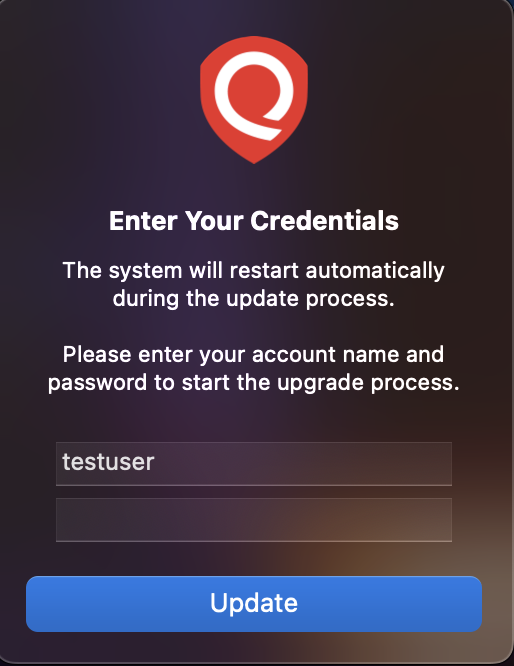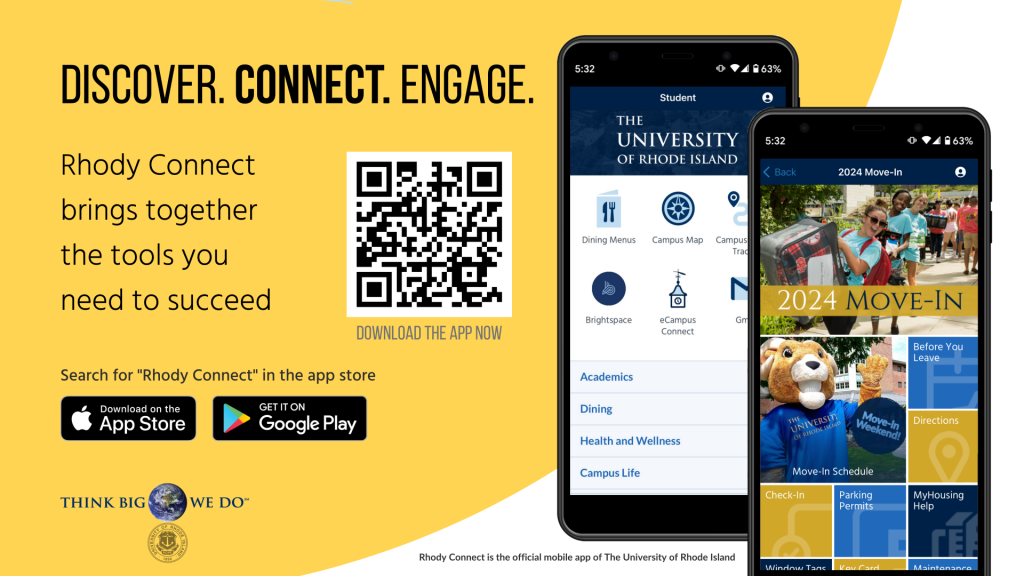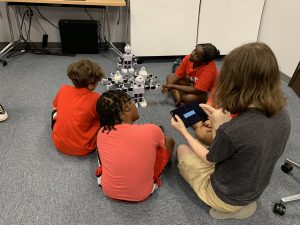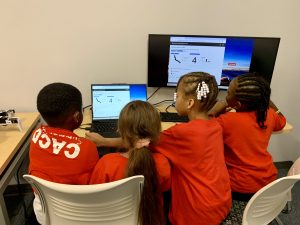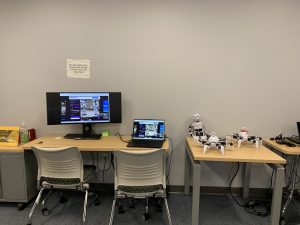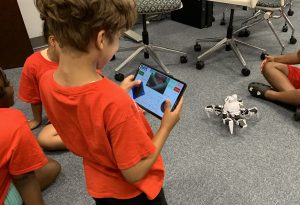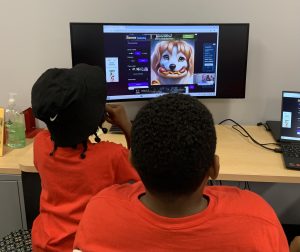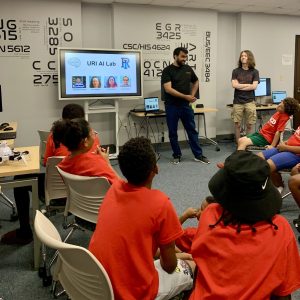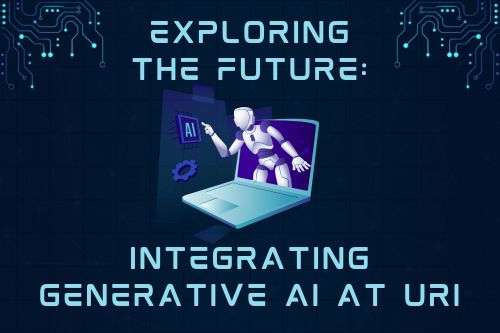A Days Journey through the AI @ URI 2.0 Summit
Come with me on a journey exploring AI in teaching learning @ URI. It began as the URI Academic Summit welcomed faculty back to campus in January to discuss AI @ URI 2.0. Opening the event, a URI panel of staff, administration and faculty discussed where URI has come since the last Academic Summit in 2024 on AI and the future based on recommendations from the AI task force report. It is important to clarify that AI includes machine learning, neural networks, and robotics (around for decades), most of the topics for today’s summit address the narrower field of AI: generative AI which became rapidly widespread through open source products (such as ChatGPT).
Innovative AI Integration in Teaching and Learning Breakout Session
This session explored the innovative ways faculty are incorporating AI into their classrooms. We heard from URI faculty, who are listed below, who have used AI for activities such as group work, individual projects, and programming assignments. Discussion included understanding the impact of AI on student learning and engagement and best practices for motivating students to use these tools effectively.
AI in Business Assignment for Game Creation
Christy Ashley, Marketing/Business
Christy Ashley discussed how students in her business courses made choices about AI tools for game creation. A guest speaker from Hasbro shared insights into how games are developed, and then she showed an example of the differences in game development using AI. Students often approached AI by simplistically replicating her work, not developing their own game creation.
Additionally, there were realtime considerations that impacted the use of the AI such as loading issues. Ashley highlighted the value of experimenting with new approaches in the classroom, experiencing mistakes, and thoughtfully reflecting on how to improve them for future use.
AI in Classroom Discussions and Assignments
Steven Atlas, Marketing/Business
Steven Atlas explored AI’s integration into classroom discussions, embedding learning about AI through discussion forums. He expressed the importance of determining clear parameters for the students. He also introduced optional AI supplements to assignments, allowing students to experiment with AI-generated content and refine their understanding.
For final projects, Steven encouraged students to use AI to develop research questions and benchmark AI behavior against human decision-making. This approach, particularly in marketing research, allowed students to explore how AI processes information differently from humans.
AI in Biology Education
Nic Fisk, Cell & Molecular Biology
Computational biologist and education researcher Nic Fisk emphasized designing assignments suiting the desired learning outcome, which may include how AI is used in research. They contrasted Google and ChatGPT in long-term retention, generalizability, and transfer of skills developed using these tools. They also noted that students’ frustration when they encounter AI-generated errors provides opportunities for learning. For example, prompting a generative AI and identifying missing nuances or important details can help students focus on the interesting elements of their writing or research.
AI’s Analytical Power in Research: Will and Christy
Will and Christy
Will and Christy discussed examining AI’s capabilities in deep analytics, contrasting human limitations with AI’s ability to process vast amounts of data. They highlighted how AI can significantly enhance research methodologies, but also raised concerns about over-reliance on AI-generated insights.
AI in Philosophy and Writing
Will Krieger
Will Krieger explored AI’s role in philosophical writing, emphasizing structured approaches to AI-assisted writing. Writing has always been the way we thought we need to assess philosophy. He has been exploring the outcomes of assignments and courses to consider integrating AI into the process. He implemented a three-submission assignment:
1 – A written detailed prompt asking for a detailed outline specifying sources, material, and objectives.
2 – Use AI to generate a structured essay based on the outline.
3 – Refine the AI-generated material into a final human-authored submission.
This three-submission assignment increases the instructor workload for assessing. Will found that this method worked well for half of the students, reinforcing the idea that specificity in AI prompting leads to better outputs.
AI’s Analytical Power in Research: Will and Christy
Vanessa Harwood
Vanessa Harwood, from the Communication Disorders field, discussed AI’s impact on speech-language pathology as it relates to the arduous chore of phonetic transcription. She noted that while AI can transcribe adult speech accurately, it often struggles with pediatric speech, and more so speech sound disorders.
However, AI tools can significantly reduce documentation time by encoding phonetic transcriptions that are arduous. She advocated for a three-step AI-assisted process that improves efficiency without sacrificing accuracy, where there is a cross check of AI output, ultimately reducing the time spent on transcribing and increasing the time spent with patients.
Session Wrap Up: AI as a Tool for Thoughtful Integration
The panel concluded with a call for thoughtful AI integration in education. Faculty recognized AI’s ability to create efficiencies, but have also emphasized that it should not replace critical thinking. By understanding AI’s strengths and limitations, faculty can design courses that leverage AI’s benefits while maintaining academic rigor.
Keynote: Courage, AI Systems, and Troubles We Cannot Avoid
Dr. Vance Ricks
Dr. Ricks delved into AI ethics, discussing values in AI design, issue-spotting, and professional responsibilities. He introduced concepts of moral and techno-moral courage, drawing on Shannon Valor’s philosophy of ethical AI use. Key themes included:
- The importance of intelligent hope and intelligent fear in AI adoption.
- Recognizing AI as a socio-technological system embedded in broader social contexts.
- Ethical considerations surrounding AI-driven decisions, especially in teaching and evaluation.
Broader Implications for Teaching Practices
Faculty acknowledged that both students and professors could misuse AI, raising concerns about academic integrity. The conversation emphasized:
- The historical parallels between AI and past technological fears in advancements like Y2K, calculators, and Wikipedia.
- The need for well-structured assignments that encourage critical engagement with AI.
- Institutional approaches to shaping AI adoption in education, balancing efficiency with depth of learning.
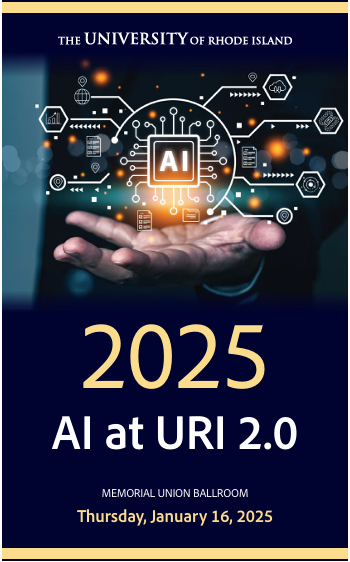
Ultimately, AI’s role in education will continue to evolve, and educators should remain adaptive, ensuring that AI serves as an enhancer to rather than a replacement for meaningful learning.– Dr. Amanda Jensen

